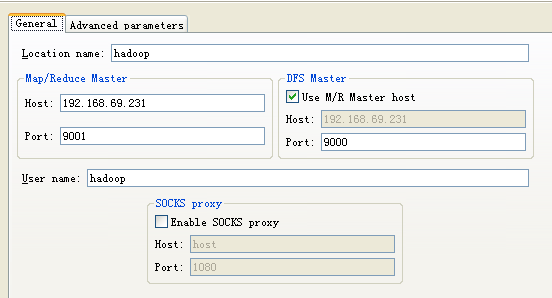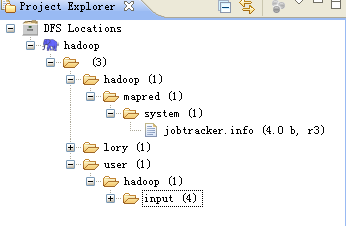Windows平台下安装Eclipse插件,开发Hadoop应用
欢迎和大家交流技术相关问题:
邮箱: jiangxinnju@163.com
博客园地址: http://www.cnblogs.com/jiangxinnju
GitHub地址: https://github.com/jiangxincode
知乎地址: https://www.zhihu.com/people/jiangxinnju
安装插件
将hadoop安装包hadoopcontribeclipse-pluginhadoop-0.20.2-eclipse-plugin.jar拷贝到eclipse的插件目录plugins下。
需要注意的是插件版本(及后面开发导入的所有jar包)与运行的hadoop一致,否则可能会出现EOFException异常。
重启eclipse,打开windows->open perspective->other->map/reduce 可以看到map/reduce开发视图。
设置连接参数
打开windows->show view->other-> map/reduce Locations视图,在点击大象后弹出的对话框(General tab)进行参数的添加:

参数说明如下:
- Location name:任意
- map/reduce master:与mapred-site.xml里面mapred.job.tracker设置一致。
- DFS master:与core-site.xml里fs.default.name设置一致。
- User name: 服务器上运行hadoop服务的用户名。
然后是打开“Advanced parameters”设置面板,修改相应参数。上面的参数填写以后,也会反映到这里相应的参数,主要关注下面几个参数:
- fs.defualt.name:与core-site.xml里fs.default.name设置一致。
- mapred.job.tracker:与mapred-site.xml里面mapred.job.tracker设置一致。
- dfs.replication:与hdfs-site.xml里面的dfs.replication一致。
- hadoop.tmp.dir:与core-site.xml里hadoop.tmp.dir设置一致。
- hadoop.job.ugi:并不是设置用户名与密码。是用户与组名,所以这里填写hadoop,hadoop。
说明:第一次设置的时候可能是没有hadoop.job.ugi和dfs.replication参数的,不要紧,确认保存。打开Project Explorer中DFS Locations目录,应该可以年看到文件系统中的结构了。但是在/hadoop/mapred/system下却没有查看权限,如下图:

而且删除文件的时候也会报错:

这个原因是我使用地本用户Administrator(我是用管理员用户登陆来地windows系统的)进行远程hadoop系统操作,没有权限。
此时再打开“Advanced parameters”设置面板,应该可以看到hadoop.job.ugi了,这个参数默认是本地操作系统的用户名,如果不幸与远程hadoop用户不一致,那就要改过来了,将hadoop加在第一个,并用逗号分隔。如:

保存配置后,重新启动eclipse。/hadoop/mapred/system下就一目了然了,删除文件也OK。

运行hadoop程序
首先将hadoop安装包下面的所有jar包都导到eclipse工程里。然后建立一个类:DFSOperator.java,该类写了四个基本方法:创建文件,删除文件,把文件内容读为字符串,将字符串写入文件。同时有个main函数,可以修改测试:
package com.kingdee.hadoop;
import java.io.BufferedReader;
import java.io.IOException;
import java.io.InputStream;
import java.io.InputStreamReader;
import org.apache.hadoop.conf.Configuration;
import org.apache.hadoop.fs.FSDataOutputStream;
import org.apache.hadoop.fs.FileSystem;
import org.apache.hadoop.fs.Path;
/**
*
* The utilities to operate file on hadoop hdfs.
*
* @author luolihui 2011-07-18
*
*/
public class DFSOperator {
private static final String ROOT_PATH = "hdfs:///";
private static final int BUFFER_SIZE = 4096;
/**
* construct.
*/
public DFSOperator(){}
/**
* Create a file on hdfs.The root path is /.<br>
* for example: DFSOperator.createFile("/lory/test1.txt", true);
* @param path the file name to open
* @param overwrite if a file with this name already exists, then if true, the file will be
* @return true if delete is successful else IOException.
* @throws IOException
*/
public static boolean createFile(String path, boolean overwrite) throws IOException
{
//String uri = "hdfs://192.168.1.100:9000";
//FileSystem fs1 = FileSystem.get(URI.create(uri), conf);
Configuration conf = new Configuration();
FileSystem fs = FileSystem.get(conf);
Path f = new Path(ROOT_PATH + path);
fs.create(f, overwrite);
fs.close();
return true;
}
/**
* Delete a file on hdfs.The root path is /. <br>
* for example: DFSOperator.deleteFile("/user/hadoop/output", true);
* @param path the path to delete
* @param recursive if path is a directory and set to true, the directory is deleted else throws an exception. In case of a file the recursive can be set to either true or false.
* @return true if delete is successful else IOException.
* @throws IOException
*/
public static boolean deleteFile(String path, boolean recursive) throws IOException
{
//String uri = "hdfs://192.168.1.100:9000";
//FileSystem fs1 = FileSystem.get(URI.create(uri), conf);
Configuration conf = new Configuration();
FileSystem fs = FileSystem.get(conf);
Path f = new Path(ROOT_PATH + path);
fs.delete(f, recursive);
fs.close();
return true;
}
/**
* Read a file to string on hadoop hdfs. From stream to string. <br>
* for example: System.out.println(DFSOperator.readDFSFileToString("/user/hadoop/input/test3.txt"));
* @param path the path to read
* @return true if read is successful else IOException.
* @throws IOException
*/
public static String readDFSFileToString(String path) throws IOException
{
Configuration conf = new Configuration();
FileSystem fs = FileSystem.get(conf);
Path f = new Path(ROOT_PATH + path);
InputStream in = null;
String str = null;
StringBuilder sb = new StringBuilder(BUFFER_SIZE);
if (fs.exists(f))
{
in = fs.open(f);
BufferedReader bf =